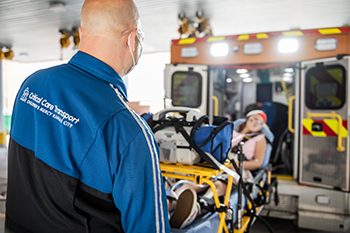Arrange a Critical Care Transport
In accordance with providing the very best care possible for every child, Children's Mercy believes that specialized care during transport can make a tremendous difference. Typically less than 10 percent of the patients transported by traditional "adult" transport teams are under the age of 14.
These systems often do not have the pediatric-specific equipment and experience to optimally manage critical care transports for neonatal and pediatric patients. Specialized transport teams have been shown to improve survival rates for neonatal and pediatric patients.

When a newborn, child or expectant mother has a serious illness or injury that requires travel to another medical facility, a specialized transport team offers continued neonatal, pediatric and obstetric inter-hospital specialty care. Pediatric/neonatal critical care transport team members work with your pediatrician, as well as hospital doctors and medical staff to ensure that your newborn or child arrives safely at the designated medical facility. Likewise, our maternal fetal transport teams work with your OB physician, our maternal fetal medicine physician and the OB or perinatologist at the medical facility accepting the transfer to ensure a safe and efficient transport for both mother and unborn baby.
Admissions, consults, and transports call
When to call for a critical care transport
The American Academy of Pediatrics' national guidelines recommend the use of neonatal/pediatric specialty team for the transfer of all patients meeting the following criteria:
-
Any patient for whom ICU admission is anticipated at the receiving hospital.
-
Patients with respiratory distress that may progress during transport.
-
Patients with a recent life-threatening event, although stable at the time of transfer.
How to access the critical care transport team:
-
Call (800) GO MERCY or (800) 466-3729. Dedicated Children's Mercy Transport Communication Specialists can assist with all transport arrangements 24 hours a day, seven days a week. This includes immediately putting you in contact with a Children's Mercy physician.
-
The appropriate transport team will be mobilized within minutes of receiving your call.
Information from the American Academy of Pediatrics Healthy Children
According to the American Academy of Pediatrics Healthy Children, members of a pediatric/neonatal critical care transport team are able to care for premature newborns and children with life-threatening conditions, illnesses, or injuries such as:
-
Extreme prematurity
-
Congenital heart disease
-
Neonatal metabolic disorders
-
Asthma or other illnesses requiring respiratory or ventilator support
-
Heart conditions
-
Seizures
-
Injuries from car or other accidents
-
Diabetes
Information needed for transport
-
Name and location of the hospital or clinic requesting transport, provider's name and call back number
-
Patient's name, age, weight, date of birth
-
Chief complaint /diagnosis and present condition
-
Medical history and allergies
-
Vital signs and assessment of ABC's
-
Treatments/medications initiated
-
IV access
-
Artificial airway
Transport dispatch process
-
Children's Mercy fellow or attending neonatologists, pediatric critical care and maternal fetal medicine physicians provide medical control for the transport teams and will be connected with you immediately.
-
Appropriate mode of transport for the patient determined: ground ambulance, helicopter, turbo prop or jet airplane
-
The transport team is dispatched
-
The requesting facility is notified of the mode of transport and given an estimated time of arrival once the team is enroute
-
A hospital bed is secured for the patient
Preparation and stabilization of the patient
-
EMTALA/Cobra transfer form
-
Admission data sheet
-
Discharge summary
-
History and physical
-
Physician progress notes including discharge summary if inpatient
-
Nurses' notes
-
Laboratory results
-
X-rays/CT scans/MRI/Ultrasound (films or disc)
-
Mother's chart (neonatal or maternal fetal transports)
-
For stabilization measures, please inquire with the medical control physician when initiating transport. Otherwise consider the American Heart Association and the American Academy of Pediatrics Guidelines for the Neonatal Resuscitation Program, Advanced Pediatric Life Support or Advanced Cardiac Life Support.
